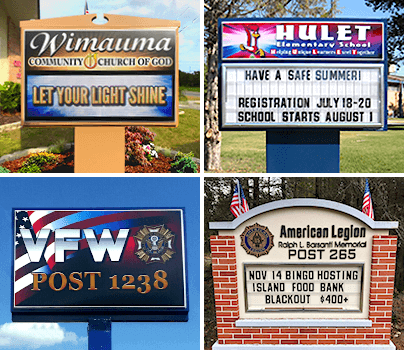Since the advent of digital signs, a battle has been waged between the schools and churches that want to use this modern communication tool and the residents that say, ‘Not in my neighborhood.' These residents desire to maintain the traditional ambiance in the areas in which they live.
While more urban high-density commercial areas generally allow digital signage with few or no restrictions, most schools and churches are located in residential areas where they are banned or placed under strict zoning restrictions. This often leaves these organizations feeling stuck with lackluster signage.The real-time communication of a digital signs is desirable to many organizations because messages can be programmed with ease via computer and transmitted to the sign without ever leaving the building. Several messages per day can be communicated to the patrons and surrounding community regarding upcoming events and games, volunteer opportunities, even inclement weather conditions, and can be changed in minutes, if needed. However, these same reasons are considered detractors to some of the residents in the neighborhoods in which the organizations are located.
Several schools and at least one church in Kansas City neighborhoods inadvertently installed digital signs where they were not allowed, sparking a debate that has the city council considering new regulations to permit some digital signs in these areas and hopefully find a compromise that the neighborhoods, schools, and churches can live with. This may prove to be a difficult task, as both sides have strong opinions on the matter.
One south Kansas City activist worries that a compromise will open the floodgates to everyone, saying, "It degrades the neighborhood. We are looking like Las Vegas and it's going to be all over the place." On the other hand, school officials think that they dress up the school and help to encourage parent and patrons to be involved.
Frankly, it dresses up the school. We're always trying to encourage parents and patrons to be involved in their schools.
Allan Markley, Superintendent in Raytown.
In at least 3 separate schools, booster clubs have raised thousands of dollars that they used to replace old, broken signs with new digital signs that had already been installed when they were informed by the city code officials that they were not allowed. Northland Councilman Ed Ford introduced an ordinance in May to grant a special-use permit that would allow these schools to keep their signs.
"The signs were disseminating useful and helpful information to patrons of the schools, and it just seemed to be a waste to require them to take the signs down." The ordinance went to the City Planning commission on July 1, but the vote was postponed to allow all interested parties to reach a consensus.
Since July, Ford proposed taking churches out of the mix, and then to just include secondary schools on a minimum of 30 acres, but churches and elementary schools don't want to be left out. With attorney Bernard Rhodes going as far as to say, "It is patently unconstitutional to allow Phillips 66 on Antioch Road to convey on its digital sign the commercial message of $3.16 per gallon of gas, while forbidding the Antioch Community Church from conveying on its digital sign the religious, noncommercial message of John 3:16 from the bible." It seems that this is not going to be a situation that gets resolved without some in the community feeling slighted.
To read the full article go to: http://www.kansascity.com/news/government-politics/article2120297.html
